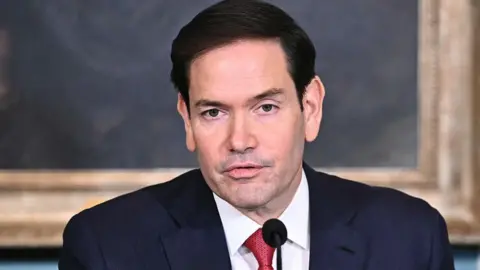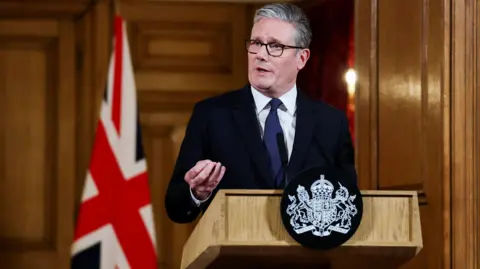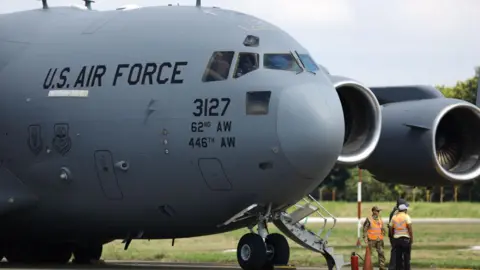US Sanctions Palestinian Organizations: What to Know
What if pursuing justice on the global stage or simply gaining recognition for your nation invited severe, unprecedented penalties from a global superpower? This isn't a hypothetical. This is the stark reality currently reshaping the diplomatic landscape of the Middle East, as the United States unleashes a new wave of sanctions against key Palestinian institutions.
The move, a bombshell announcement from Washington, promises to send ripples through international relations, potentially derailing already fragile peace efforts. But what exactly triggered this high-stakes diplomatic confrontation, and what does it mean for the future of the Israeli-Palestinian conflict?
**US Slams Palestinian Governance: A New Era of Sanctions?**
 In a powerful declaration, the US State Department has announced its intention to impose significant **US sanctions** on both the **Palestinian Authority (PA)**, the self-governing body established by the Oslo peace accords, and the **Palestine Liberation Organization (PLO)**, which officially represents the Palestinian people. The core of these **visa restrictions** is stark: members of the PLO and officials from the PA will now be denied entry into the United States.
This isn't merely a travel inconvenience. It's a strategic move designed to isolate and pressure, effectively tightening the screws on organizations central to Palestinian self-governance and their voice on the international stage. But why now? And why such a strong reaction?
**The Global Push for Palestinian Statehood: A Provocation for Washington**
In a powerful declaration, the US State Department has announced its intention to impose significant **US sanctions** on both the **Palestinian Authority (PA)**, the self-governing body established by the Oslo peace accords, and the **Palestine Liberation Organization (PLO)**, which officially represents the Palestinian people. The core of these **visa restrictions** is stark: members of the PLO and officials from the PA will now be denied entry into the United States.
This isn't merely a travel inconvenience. It's a strategic move designed to isolate and pressure, effectively tightening the screws on organizations central to Palestinian self-governance and their voice on the international stage. But why now? And why such a strong reaction?
**The Global Push for Palestinian Statehood: A Provocation for Washington**
 The timing of these **US sanctions** is no coincidence. It arrives hot on the heels of a French-Saudi led conference at the United Nations, a pivotal gathering aimed at galvanizing global support for a future **two-state solution**. This wasn't just talk; it included groundbreaking commitments from European allies. France, the UK, and Canada notably pledged to recognize an independent, demilitarized Palestinian state later this year, albeit with certain conditions.
Washington’s response was swift and furious. The **Trump administration** had privately warned of severe diplomatic consequences if attendees at the UN conference made "anti-Israel" declarations. These new sanctions are seen as the immediate and pointed fulfillment of that warning, punishing those who dared to challenge the prevailing US stance on the **Israel-Palestine conflict**.
**Washington's Fury: Accusations of "Terror Support" and International Maneuvers**
The timing of these **US sanctions** is no coincidence. It arrives hot on the heels of a French-Saudi led conference at the United Nations, a pivotal gathering aimed at galvanizing global support for a future **two-state solution**. This wasn't just talk; it included groundbreaking commitments from European allies. France, the UK, and Canada notably pledged to recognize an independent, demilitarized Palestinian state later this year, albeit with certain conditions.
Washington’s response was swift and furious. The **Trump administration** had privately warned of severe diplomatic consequences if attendees at the UN conference made "anti-Israel" declarations. These new sanctions are seen as the immediate and pointed fulfillment of that warning, punishing those who dared to challenge the prevailing US stance on the **Israel-Palestine conflict**.
**Washington's Fury: Accusations of "Terror Support" and International Maneuvers**
 The **State Department's** rationale for its unprecedented action was twofold. First, it accused the PA and PLO of actively working to "internationalize its conflict with Israel." This refers directly to their efforts to seek justice through global bodies like the **International Criminal Court (ICC)** and the **International Court of Justice (ICJ)**—moves fiercely opposed by both the US and Israel.
Second, and perhaps more controversially, the US reiterated its long-standing complaints that the PLO and PA continue "to support terrorism." This accusation encompasses everything from alleged incitement and glorification of violence (especially in textbooks) to providing **payments and benefits to Palestinian terrorists and their families**.
Adding a layer of complexity, this aggressive stance comes just months after the **Trump administration** controversially lifted sanctions on violent Israeli settlers who have been implicated in the killings of Palestinians in the **occupied West Bank**. This perceived double standard has ignited fierce debate about the impartiality of US foreign policy in the region.
The **State Department's** rationale for its unprecedented action was twofold. First, it accused the PA and PLO of actively working to "internationalize its conflict with Israel." This refers directly to their efforts to seek justice through global bodies like the **International Criminal Court (ICC)** and the **International Court of Justice (ICJ)**—moves fiercely opposed by both the US and Israel.
Second, and perhaps more controversially, the US reiterated its long-standing complaints that the PLO and PA continue "to support terrorism." This accusation encompasses everything from alleged incitement and glorification of violence (especially in textbooks) to providing **payments and benefits to Palestinian terrorists and their families**.
Adding a layer of complexity, this aggressive stance comes just months after the **Trump administration** controversially lifted sanctions on violent Israeli settlers who have been implicated in the killings of Palestinians in the **occupied West Bank**. This perceived double standard has ignited fierce debate about the impartiality of US foreign policy in the region.
 **Palestinian Leadership Cries "Revenge!"**
Unsurprisingly, the reaction from Palestinian leadership has been one of outrage and defiance. One leading Palestinian politician described the **US sanctions** as nothing short of "revenge" for the growing international recognition of **Palestinian statehood**. The PA echoed this sentiment, stating that these "campaigns have been escalating in response to the significant and successive achievements of Palestinian diplomacy," specifically citing the recent state recognitions and the successful UN conference.
Mustafa Barghouti, a prominent figure in the **Palestinian National Initiative (PNI)** and part of the PLO, offered a sharp rebuke. Speaking to the BBC, he declared, "Trump's administration, instead of punishing the criminals who are committing war crimes in Gaza and in the West Bank, which is Israel, is instead… punishing the victim, which is the Palestinian people."
**Palestinian Leadership Cries "Revenge!"**
Unsurprisingly, the reaction from Palestinian leadership has been one of outrage and defiance. One leading Palestinian politician described the **US sanctions** as nothing short of "revenge" for the growing international recognition of **Palestinian statehood**. The PA echoed this sentiment, stating that these "campaigns have been escalating in response to the significant and successive achievements of Palestinian diplomacy," specifically citing the recent state recognitions and the successful UN conference.
Mustafa Barghouti, a prominent figure in the **Palestinian National Initiative (PNI)** and part of the PLO, offered a sharp rebuke. Speaking to the BBC, he declared, "Trump's administration, instead of punishing the criminals who are committing war crimes in Gaza and in the West Bank, which is Israel, is instead… punishing the victim, which is the Palestinian people."
 Israel, on the other hand, warmly welcomed the sanctions. Foreign Minister Gideon Sa'ar thanked US Secretary of State Marco Rubio, stating, "This important action by [President Trump] and his administration also exposes the moral distortion of certain countries that ran to recognise a virtual Palestinian state while turning a blind eye to its support for terror and incitement."
So, what exactly are these "payments" that fuel such fervent accusations and ignite a global debate?
**The "Terror Payments" Debate: A Battle of Narratives and Human Rights**
Israel, on the other hand, warmly welcomed the sanctions. Foreign Minister Gideon Sa'ar thanked US Secretary of State Marco Rubio, stating, "This important action by [President Trump] and his administration also exposes the moral distortion of certain countries that ran to recognise a virtual Palestinian state while turning a blind eye to its support for terror and incitement."
So, what exactly are these "payments" that fuel such fervent accusations and ignite a global debate?
**The "Terror Payments" Debate: A Battle of Narratives and Human Rights**
 At the heart of the "support for terrorism" complaint lies an intricate web of contention surrounding the PA's payments to prisoners and their families. The PA has consistently rejected the accusations, arguing that these are not "salaries" for terrorists but rather essential stipends provided to the families of all Palestinian prisoners held under Israel's military occupation.
Palestinians view all those detained by Israel and jailed by its military courts, which boast an astonishing 99% conviction rate, as political prisoners. Many, they argue, are not given due process and are held in breach of the Fourth Geneva Convention. For these families, often the sole breadwinners are imprisoned, making these payments a humanitarian lifeline.
Intriguingly, French officials revealed last week that the PA had expressed its willingness to end these payments in response to France's commitment to recognize a Palestinian state – a potential avenue for de-escalation that now seems jeopardized.
At the heart of the "support for terrorism" complaint lies an intricate web of contention surrounding the PA's payments to prisoners and their families. The PA has consistently rejected the accusations, arguing that these are not "salaries" for terrorists but rather essential stipends provided to the families of all Palestinian prisoners held under Israel's military occupation.
Palestinians view all those detained by Israel and jailed by its military courts, which boast an astonishing 99% conviction rate, as political prisoners. Many, they argue, are not given due process and are held in breach of the Fourth Geneva Convention. For these families, often the sole breadwinners are imprisoned, making these payments a humanitarian lifeline.
Intriguingly, French officials revealed last week that the PA had expressed its willingness to end these payments in response to France's commitment to recognize a Palestinian state – a potential avenue for de-escalation that now seems jeopardized.
 **A Strategic Vacuum and Lingering Questions**
This diplomatic broadside comes at a time when the US finds itself increasingly isolated on the international stage, particularly regarding its unwavering support for Israel's ongoing war in Gaza. The recent UN conference starkly exposed a strategic vacuum, traditionally filled by Washington's leadership in **diplomatic efforts** towards a viable, longer-term peace between Israelis and Palestinians.
While framed as sanctions, the travel ban on Palestinian officials may be a more limited maneuver than a full range of financial penalties. Yet, it adds another layer of complexity to an already challenging process; PA and PLO officials already face a lengthy, difficult process to obtain visas for US travel, often requiring special and rarely granted exemptions.
**A Strategic Vacuum and Lingering Questions**
This diplomatic broadside comes at a time when the US finds itself increasingly isolated on the international stage, particularly regarding its unwavering support for Israel's ongoing war in Gaza. The recent UN conference starkly exposed a strategic vacuum, traditionally filled by Washington's leadership in **diplomatic efforts** towards a viable, longer-term peace between Israelis and Palestinians.
While framed as sanctions, the travel ban on Palestinian officials may be a more limited maneuver than a full range of financial penalties. Yet, it adds another layer of complexity to an already challenging process; PA and PLO officials already face a lengthy, difficult process to obtain visas for US travel, often requiring special and rarely granted exemptions.
 It remains unclear whether these new rules will even affect officials working for the Palestinian mission to the United Nations in New York, as the current Palestinian ambassador to the UN and his deputy are both US citizens.
Will this latest **Trump administration** maneuver truly achieve its desired outcome, or merely deepen the diplomatic chasm and further complicate the elusive quest for peace in one of the world's most volatile regions? The answer will undoubtedly shape the future of **Middle East diplomacy** for years to come.
It remains unclear whether these new rules will even affect officials working for the Palestinian mission to the United Nations in New York, as the current Palestinian ambassador to the UN and his deputy are both US citizens.
Will this latest **Trump administration** maneuver truly achieve its desired outcome, or merely deepen the diplomatic chasm and further complicate the elusive quest for peace in one of the world's most volatile regions? The answer will undoubtedly shape the future of **Middle East diplomacy** for years to come.

Image 1

Image 2

Image 3

Image 4

Image 5

Image 6

Image 7

Image 8
Comments
Post a Comment